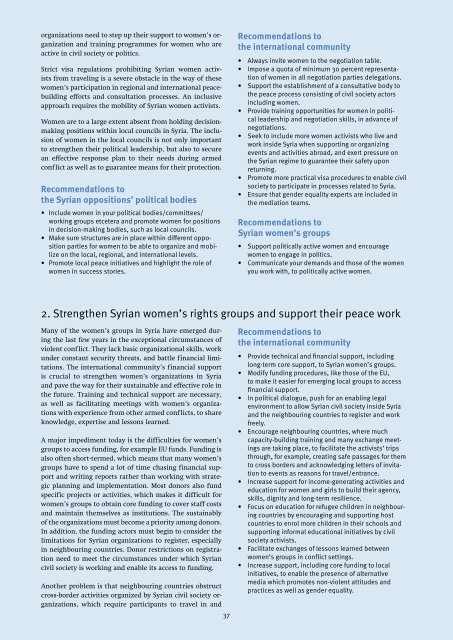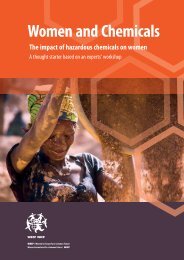future now”
YAO19
YAO19
You also want an ePaper? Increase the reach of your titles
YUMPU automatically turns print PDFs into web optimized ePapers that Google loves.
organizations need to step up their support to women’s organization<br />
and training programmes for women who are<br />
active in civil society or politics.<br />
Strict visa regulations prohibiting Syrian women activists<br />
from traveling is a severe obstacle in the way of these<br />
women’s participation in regional and international peacebuilding<br />
efforts and consultation processes. An inclusive<br />
approach requires the mobility of Syrian women activists.<br />
Women are to a large extent absent from holding decisionmaking<br />
positions within local councils in Syria. The inclusion<br />
of women in the local councils is not only important<br />
to strengthen their political leadership, but also to secure<br />
an effective response plan to their needs during armed<br />
conflict as well as to guarantee means for their protection.<br />
Recommendations to<br />
the Syrian oppositions’ political bodies<br />
• Include women in your political bodies/committees/<br />
working groups etcetera and promote women for positions<br />
in decision-making bodies, such as local councils.<br />
• Make sure structures are in place within different opposition<br />
parties for women to be able to organize and mobilize<br />
on the local, regional, and international levels.<br />
• Promote local peace initiatives and highlight the role of<br />
women in success stories.<br />
Recommendations to<br />
the international community<br />
• Always invite women to the negotiation table.<br />
• Impose a quota of minimum 30 percent representation<br />
of women in all negotiation parties delegations.<br />
• Support the establishment of a consultative body to<br />
the peace process consisting of civil society actors<br />
including women.<br />
• Provide training opportunities for women in political<br />
leadership and negotiation skills, in advance of<br />
negotiations.<br />
• Seek to include more women activists who live and<br />
work inside Syria when supporting or organizing<br />
events and activities abroad, and exert pressure on<br />
the Syrian regime to guarantee their safety upon<br />
returning.<br />
• Promote more practical visa procedures to enable civil<br />
society to participate in processes related to Syria.<br />
• Ensure that gender equality experts are included in<br />
the mediation teams.<br />
Recommendations to<br />
Syrian women’s groups<br />
• Support politically active women and encourage<br />
women to engage in politics.<br />
• Communicate your demands and those of the women<br />
you work with, to politically active women.<br />
2. Strengthen Syrian women’s rights groups and support their peace work<br />
Many of the women’s groups in Syria have emerged during<br />
the last few years in the exceptional circumstances of<br />
violent conflict. They lack basic organizational skills, work<br />
under constant security threats, and battle financial limitations.<br />
The international community’s financial support<br />
is crucial to strengthen women’s organizations in Syria<br />
and pave the way for their sustainable and effective role in<br />
the <strong>future</strong>. Training and technical support are necessary,<br />
as well as facilitating meetings with women’s organizations<br />
with experience from other armed conflicts, to share<br />
knowledge, expertise and lessons learned.<br />
A major impediment today is the difficulties for women’s<br />
groups to access funding, for example EU funds. Funding is<br />
also often short-termed, which means that many women’s<br />
groups have to spend a lot of time chasing financial support<br />
and writing reports rather than working with strategic<br />
planning and implementation. Most donors also fund<br />
specific projects or activities, which makes it difficult for<br />
women’s groups to obtain core funding to cover staff costs<br />
and maintain themselves as institutions. The sustainably<br />
of the organizations must become a priority among donors.<br />
In addition, the funding actors must begin to consider the<br />
limitations for Syrian organizations to register, especially<br />
in neighbouring countries. Donor restrictions on registration<br />
need to meet the circumstances under which Syrian<br />
civil society is working and enable its access to funding.<br />
Another problem is that neighbouring countries obstruct<br />
cross-border activities organized by Syrian civil society organizations,<br />
which require participants to travel in and<br />
37<br />
Recommendations to<br />
the international community<br />
• Provide technical and financial support, including<br />
long-term core support, to Syrian women’s groups.<br />
• Modify funding procedures, like those of the EU,<br />
to make it easier for emerging local groups to access<br />
financial support.<br />
• In political dialogue, push for an enabling legal<br />
environment to allow Syrian civil society inside Syria<br />
and the neighbouring countries to register and work<br />
freely.<br />
• Encourage neighbouring countries, where much<br />
capacity-building training and many exchange meetings<br />
are taking place, to facilitate the activists’ trips<br />
through, for example, creating safe passages for them<br />
to cross borders and acknowledging letters of invitation<br />
to events as reasons for travel/entrance.<br />
• Increase support for income-generating activities and<br />
education for women and girls to build their agency,<br />
skills, dignity and long-term resilience.<br />
• Focus on education for refugee children in neighbouring<br />
countries by encouraging and supporting host<br />
countries to enrol more children in their schools and<br />
supporting informal educational initiatives by civil<br />
society activists.<br />
• Facilitate exchanges of lessons learned between<br />
women’s groups in conflict settings.<br />
• Increase support, including core funding to local<br />
initiatives, to enable the presence of alternative<br />
media which promotes non-violent attitudes and<br />
practices as well as gender equality.



